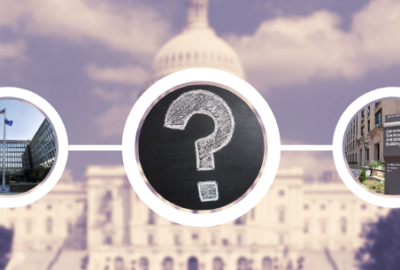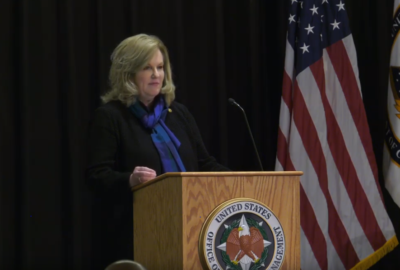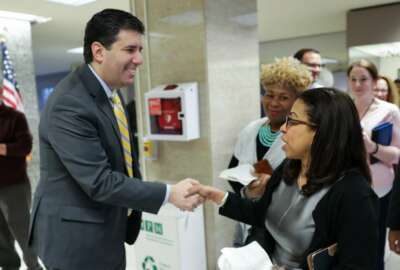OPM nominee insists past rhetoric is behind him, says discrimination has no place in government
John Gibbs, the president's latest pick to lead the Office of Personnel Management, spent much of his nomination hearing Wednesday trying to reassure senators his...
Best listening experience is on Chrome, Firefox or Safari. Subscribe to Federal Drive’s daily audio interviews on Apple Podcasts or PodcastOne.
The president’s latest pick to lead the Office Personnel Management didn’t spend much time in front of senators Wednesday afternoon laying out his long-term vision for the federal government’s top human resources agency.
Instead, he spent much of his time fielding questions about his record.
Members of the Senate Homeland Security and Governmental Affairs Committee paid little attention to the ongoing challenges that have plagued OPM for years, instead raising concerns with past rhetoric from John Gibbs, the political appointee from the Department of Housing and Urban who the president recently tapped to lead OPM.
“There have been things that you have written in the past, which have been disparaging of Islam [and] at the same time have fostered or promoted some relatively extreme, if not bizarre or nonsensical, conspiracy theories, including the idea that leaders of the Democratic party had participated in satanic rituals of some kind,” Sen. Mitt Romney (R-Utah) said during Wednesday’s hearing. “Do you believe those things? And if you do how can those possibly be separated from a human resources responsibility to people who represent a wide array of backgrounds? How do you square such unusual personal views with a responsibility to a federal workforce that is highly diverse?”
Gibbs, who’s currently the acting assistant secretary for community planning and development at HUD, said the past is behind him.
“That is not my current role,” he said. “I can assure you that I have led in a nonpartisan fashion over the past three years during my service in the government. If confirmed as OPM director I will continue to lead in a nonpartisan fashion. I’m very proud that my track record in the government confirms that. My employees, my dedicated civil servants that work under me, would confirm that.”
Gibbs said he comes from a diverse background. He said he’s heard stories from his parents who lived through segregation in the South. He said he’s experienced racism personally during his time living in Japan when he was “the only African American around for miles.”
“Any kind of disparaging or discriminatory treatment toward people of other backgrounds is something that I have never tolerated in my life, and I will absolutely never tolerate that if confirmed as director,” he said.
In his testimony, Gibbs said he’s encountered “numerous personnel management challenges” during his three-year stint at HUD, where he’s created hiring plans, made promotion decisions and coached his team of 700 people on performance improvements.
Wednesday’s meeting was the third time in a little more than three years the committee has held a nomination hearing for the OPM director, not including George Nesterczuk, the president’s first pick to lead to the agency. Nesterczuk withdrew his name from consideration but eventually joined the agency earlier this year as a senior adviser.
The Senate confirmed the previous two nominees, Jeff Pon and Dale Cabaniss, but both were forced out of the job after short stints at the agency. Acting leaders have book-ended Pon and Cabaniss’ tenures. Two of OPM’s acting directors have also served concurrently as the deputy director for management at the Office of Management and Budget.
Critics have said the co-mingling of those two positions has, in part, weakened OPM, as the agency has spent the past year dealing with uncertainty, low morale and the loss of experienced executive leadership.
Before joining HUD, Gibbs was a software developer in Silicon Valley and led non-profit teams in Japan. OPM has struggled to attract IT expertise, and some senators said Gibbs’ background was much-needed at the agency.
But Sen. Gary Peters (D-Mich.), the committee’s ranking member, said there’s more to the job.
“In addition to somebody who can fix outdated systems and processes, OPM needs a leader who will tamp down controversies and bring people together,” he said in a written statement. “I am concerned that you have engaged in reckless political discourse that could undermine your ability to do this.”
Government groups skeptical of Gibbs’ nomination
Gibbs’ nomination has so far stirred up some debate among federal employee and government groups.
In a letter to committee leadership, four government oversight groups raised their concerns about Gibbs’ past statements and his prior government experience, citing an old Tweet where he praised an effort to ensure new hires are loyal to the president.
“The rhetoric used by the nominee raises serious questions about his willingness and ability to earnestly serve as director of an agency designed to be independent of political motives and to ensure that employees are protected from political interference in their work as they serve the American public,” the oversight groups, which include the Project on Government Oversight and the Government Accountability Project, wrote in a letter to Chairman Ron Johnson (R-Wis.) and Peters.
The National Active and Retired Federal Employees (NARFE) Association and Senior Executives Association were more measured in their approach, reminding the committee of the high stakes facing OPM. The agency has been plagued by years of acting leadership and uncertainty.
“OPM and the federal workforce are at a critical inflection point. As the committee with jurisdiction over both, you must ask both yourselves and Mr. Gibbs the following: Will the federal government be an employer of last resort or of first choice?” Ken Thomas, NARFE’s national president, and Bob Corsi, SEA’s interim president, wrote in a letter to the committee. “OPM’s systems and processes are in dire need of modernization, and NARFE and SEA fully support efforts to improve the ability of OPM to carry out its mission and fulfill its responsibilities.”
Senators spent the majority of their time questioning Gibbs about his social media posts and television appearances as a political commentator. They did not ask Gibbs about his opinions of the Trump administration’s proposed OPM merger with the General Services Administration — or ongoing efforts to reexamine the OPM mission.
Like his predecessors, transforming OPM’s paper-based retirement processes is a top IT modernization priority, Gibbs told the Senate committee.
“We’re going to give it our best shot if confirmed,” he said of OPM’s antiquated retirement system. “I understand there is a cave in Pennsylvania with tons and tons of files on paper. There’s been ongoing efforts to address that and get some of that on an electronic format.”
Gibbs said his IT background could prove valuable. Technology and innovation is part of his DNA, he said.
“A lot of times when you’re looking at an IT problem it is sometimes not an IT problem. It’s a culture or personality problem,” Gibbs said. “Being really strategic about engaging the personalities involved to let them know that if you’re making a modernization, I’m not disrespecting you or saying I’m going to take away your responsibilities or saying that you’re incompetent. I’m saying that our dedicated public servants and retirees deserve to have their systems work faster.”
Copyright © 2025 Federal News Network. All rights reserved. This website is not intended for users located within the European Economic Area.
Nicole Ogrysko is a reporter for Federal News Network focusing on the federal workforce and federal pay and benefits.
Follow @nogryskoWFED
Related Stories






